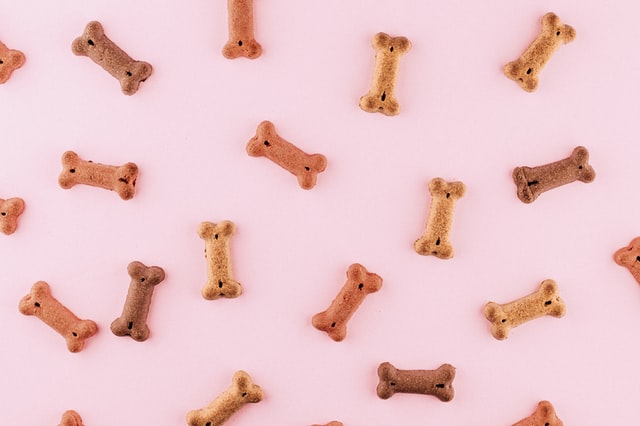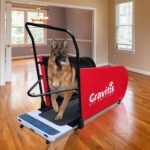Canine obesity is on the rise (as is human obesity, for that matter), and it is our job as dog owners to do our best to not only treat it, but prevent it.
While we may find our pups just as cute when they put on a bit of weight (especially if they are already small and cute), our dogs certainly don’t appreciate it. Not only can obesity cause a whole host of health issues, it significantly reduces a dog’s quality of life. Add to that the fact that obese dogs also live shorter lives, and you can clearly see why we need to step up the game and make sure our dogs stay at a healthy weight.
Let’s take a look at the different ways we can help our dogs remain lean and happy.
Table of Contents
How Can We Prevent Obesity in Dogs?
Understand Your Dog’s Weight and Shape
First of all, you need to make sure you are quite clear on your dog’s specific needs, in terms of both diet and exercise.
Some dogs need a lot more daily exercise than others, and were literally born to run. Others are more on the couch potato side of the spectrum, and may prefer to lounge around most of the day. The amount of time they spend exercising will directly influence how much food they need to be consuming.

Try to apply some basic logic to the issue. If you and your pooch usually go for a 2-mile walk, but you have just come home from a 5-mile one, chances are they will need a bit more sustenance than usual. Being able to make these kinds of judgement calls will help you keep your pup healthy.
Once you understand what your dog needs to stay healthy (and your best source of information on the subject is a combination of your vet and the internet - just make sure you read several trusted sources), and what they actually look like fit, you can monitor their weight and ensure they are getting what they need on a daily basis.
Bear in mind that the average weight of a dog varies greatly - so don’t just go by what the scale is telling you to determine if your pooch is healthy or not.
How Can We Prevent Obesity in Dogs?
Choose the Right Foods
Dog food is not nearly as regulated as human food, and not enough research has yet been conducted to tell us exactly what our dogs need to eat, how often, and in what quantities. Sadly, there is a lot of sub-standard dog food on the market as well, full of sugars, processed ingredients and additives that make it very high in calories, but rather low in nutrients.
As a general rule of thumb, you want your dog to eat plenty of protein from natural sources. Fiber also plays an important role in a dog’s diet, but carbs on the other hand do not. Foods that are high in protein, low in carbs and contain what we can only refer to as “real food” are the best choice.
You also need to consider the age and size of your dog when choosing the right food. Puppies, adult dogs and senior dogs all have different needs, and different breeds also require a slightly different diet.
If your dog has a health condition as well, you need to make sure their diet matches their needs. They may need higher water intake, for instance, so your best course of action is always to check with your vet and ask them for recommendations. Raw food also trumps kibble in most cases, but again, it’s a decision that needs to be made based on your dog’s needs, and not random advice from the internet.
Bear in mind that there are breeds that are more prone to weight gain than others, including Pugs, Labradores, Basset Hounds and Dachshunds, so if this is your dog, know that you will have to pay special attention to their diet.

How Can We Prevent Obesity in Dogs?
Monitor Their Portions
How much you feed your dog plays an equally important role in their fitness levels as what you feed them. Too much of the best quality food can still lead to weight gain and obesity.
You will often get a recommendation on portion sizes on the packaging, but this may not necessarily be accurate, so you are again best advised to check in with your vet. Notice how your dog is behaving after a meal to help you determine whether they have eaten a bit too much, or perhaps not enough.
Be mindful of the kind and amount of treats you give your dog too. We often forget to take them into account when considering the amount of food we feed our dog, yet low quality treats tend to be very calorie dense, and can in fact be the main weight gain culprit.
How Can We Prevent Obesity in Dogs?
Adhere to Specific Meal Times
Try to establish a very specific feeding routine and stick to it. This may not always be possible, but as long as your dog knows when to expect food, they will be much less likely to “beg” for food.
Dogs are quite quick to learn when food is available and where it will be coming from. If you instill a specific routine, they won’t focus on food as much, knowing it’s arriving at such and such a time.
Randomly feeding your dog can mess with their digestion as well, so a set routine is the best choice.
How Can We Prevent Obesity in Dogs?
Consider Getting a Feeding Toy
Feeding toys are usually given to dogs who need to lose weight, but they can also be used to prevent obesity. These toys (or bowls) will make a dog work for their food. They will need to move around, which will force them to eat more slowly. This is great for their digestion, plus they will be burning a few extra calories.
Do bear in mind that some dogs simply don’t like these kinds of toys and may choose never to actually use them. There are bowls that prevent a dog from eating their meal too fast as well, so perhaps your dog might take to that option.
Again, there are pups that simply refuse to eat out of any bowl that is not their bowl, so you may encounter some serious resistance.
How Can We Prevent Obesity in Dogs?
Make Sure They Exercise
All dogs need regular exercise to stay both physically and mentally fit. How much exercise your dog needs will be determined by their age, breed and general health. Of course, there can be exceptions to these general rules, and you might find a lazy Corgi, but it doesn’t happen often.
The simplest and most readily available exercise is of course walking. As it will get you more active too, it’s a great way to spend time with your pet and improve both of your fitness levels.
If you find you are unable to walk your dog every day, or live in a place where harsh weather prevents you from venturing outside during certain times of the year, you can also get an indoor dog treadmill. It’s a handy way to ensure your dog remains active, and you won’t have to worry about scheduling conflicts and the potential torrential downpour.
Running, playing fetch, swimming and hiking are of course also welcome activities. Just make sure you clear them with your vet first, and build up your dog’s endurance slowly if you need to.
How Can We Prevent Obesity in Dogs?
Keep Yourself Accountable
In order to make sure you remain consistent and on the right track, schedule regular vet visits. The vet will both weigh your dog and perform a BCS checkup to ensure your dog is not packing more fat than they should.
Staying informed is a great way to stay accountable, and knowing exactly how healthy and fit your dog is will allow you to make the small changes that are often all it takes. Remember, a major transformation is always more difficult than those tiny tweaks that can make all the difference.
How Can We Prevent Obesity in Dogs?
Consider Your Own Habits
Your own relationship with food may be playing a huge role in the way you feed your dog. Owners who are overweight themselves tend to overfeed their pets, as well as owners who humanize their pets more.
In order to make sure you are not inadvertently doing the wrong thing, educate yourself about the amount of food and exercise your dog needs, and do your best to comply with these needs. Don’t use food as a reward (and if you do, make sure the treats you give your dog are the healthiest they can be), and don’t feed your dog to make them feel “happier”.
How Can We Prevent Obesity in Dogs?
To Sum It Up
Canine obesity can easily be prevented. All you have to do is monitor the kind and amount of food your dog is consuming, make sure they exercise regularly, and keep their health in check.
Spelled out like that, perhaps it sounds more difficult than it actually is. By educating yourself about your dog's needs and making sure you source the best food and spend plenty of active time together, you can not only keep your pet at a healthy weight, but can also boost your own mental health and enjoy all that love only a dog is able to provide.






